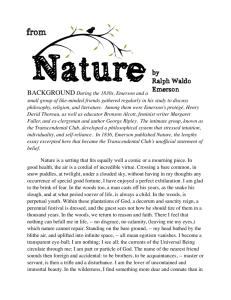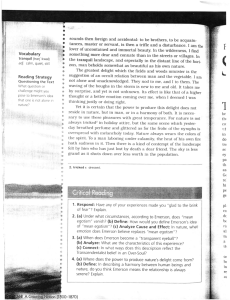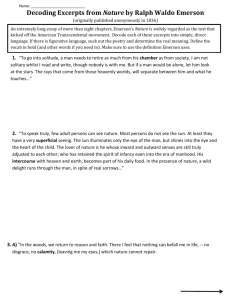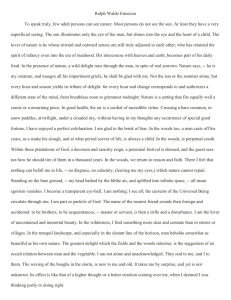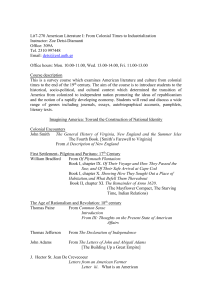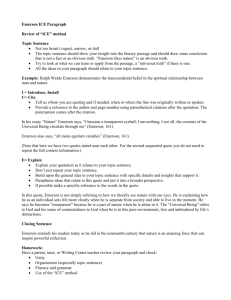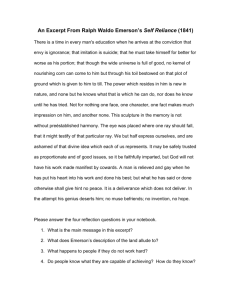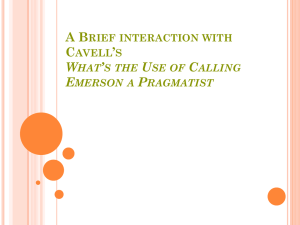Nature by Ralph Waldo Emerson Annotated Reading Guide “Nature
advertisement
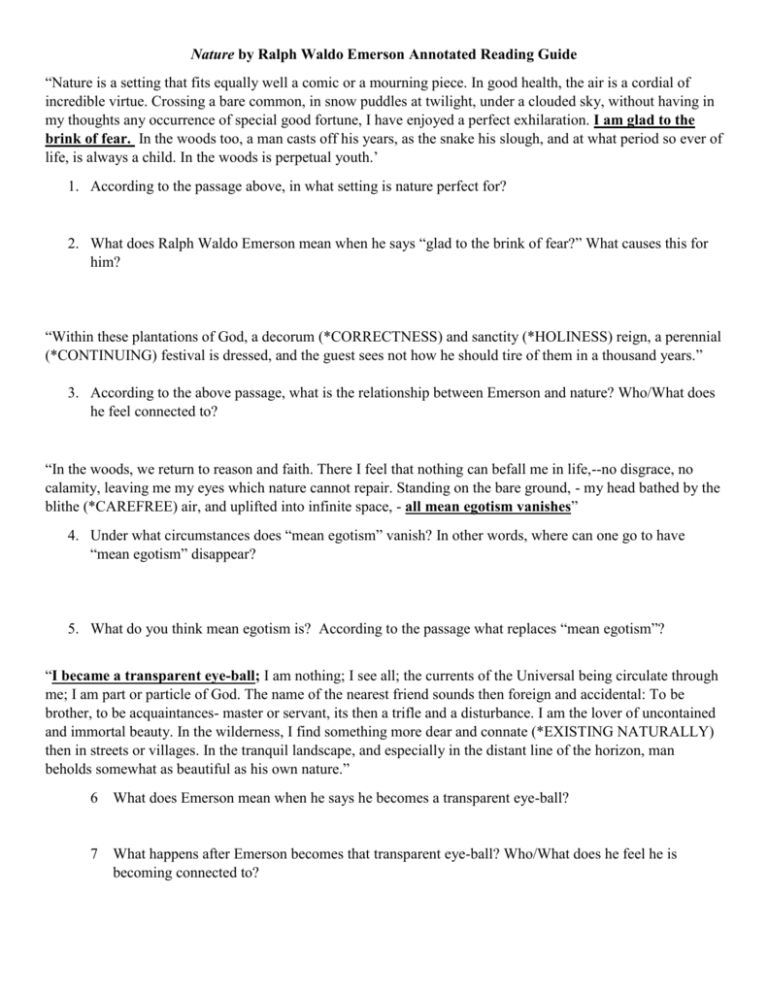
Nature by Ralph Waldo Emerson Annotated Reading Guide “Nature is a setting that fits equally well a comic or a mourning piece. In good health, the air is a cordial of incredible virtue. Crossing a bare common, in snow puddles at twilight, under a clouded sky, without having in my thoughts any occurrence of special good fortune, I have enjoyed a perfect exhilaration. I am glad to the brink of fear. In the woods too, a man casts off his years, as the snake his slough, and at what period so ever of life, is always a child. In the woods is perpetual youth.’ 1. According to the passage above, in what setting is nature perfect for? 2. What does Ralph Waldo Emerson mean when he says “glad to the brink of fear?” What causes this for him? “Within these plantations of God, a decorum (*CORRECTNESS) and sanctity (*HOLINESS) reign, a perennial (*CONTINUING) festival is dressed, and the guest sees not how he should tire of them in a thousand years.” 3. According to the above passage, what is the relationship between Emerson and nature? Who/What does he feel connected to? “In the woods, we return to reason and faith. There I feel that nothing can befall me in life,--no disgrace, no calamity, leaving me my eyes which nature cannot repair. Standing on the bare ground, - my head bathed by the blithe (*CAREFREE) air, and uplifted into infinite space, - all mean egotism vanishes” 4. Under what circumstances does “mean egotism” vanish? In other words, where can one go to have “mean egotism” disappear? 5. What do you think mean egotism is? According to the passage what replaces “mean egotism”? “I became a transparent eye-ball; I am nothing; I see all; the currents of the Universal being circulate through me; I am part or particle of God. The name of the nearest friend sounds then foreign and accidental: To be brother, to be acquaintances- master or servant, its then a trifle and a disturbance. I am the lover of uncontained and immortal beauty. In the wilderness, I find something more dear and connate (*EXISTING NATURALLY) then in streets or villages. In the tranquil landscape, and especially in the distant line of the horizon, man beholds somewhat as beautiful as his own nature.” 6 What does Emerson mean when he says he becomes a transparent eye-ball? 7 What happens after Emerson becomes that transparent eye-ball? Who/What does he feel he is becoming connected to? “The greatest delight which the fields and woods minister, is the suggestion of an occult relation between man and the vegetable. I am not alone and unacknowledged. They nod to me, and I to them. The waving of the boughs in the storm, is new to me and old. I takes me by surprise, and yet is not unknown. Its effect is like that of a higher thought or a better emotion coming over me, when I deemed I was thinking justly or doing right.” 8. Which emotions does Emerson experience when in the woods? “Yet it is certain that the power to produce this delight, does not reside in nature, but in man, or in a harmony of both.” 9. According to Emerson where does the power to produce “the delight” come from? 10. Do you agree or disagree with this statement about a harmony between human beings and nature? Do you think Emerson means to say that the relationship is always peaceful or not? Explain. “It is necessary to use these pleasures with great temperance (*RESTRAINT). For nature is not always tricked in holiday attire, but the same scene which yesterday breathed perfume and glitters as for the frolic of the nymphs is overspread with melancholy (*GLOOMY) today.” 11. According to the above passage, is our experience with nature the same every time we go into the woods; explain? Complete reading questions: 1. What is the underlying theme of Nature? What is the underlying life lesson Emerson is trying to teach us through this essay? 2. What is the tone of Nature? Utilize diction to support your choice. 3. How are the themes found in Nature similar to those from Bryant’s “Thanatopsis”? 4. Find an example of a simile and explain its effect in this passage 5. Find an example of a hyperbole and explain its effect in this passage? 6. Find textual evidence for the following transcendentalist themes. Man is inherently good and should follow his own beliefs (Individuality). Nature, humans, and God are all interconnected. A truth exists beyond reason and experience (imagination).
